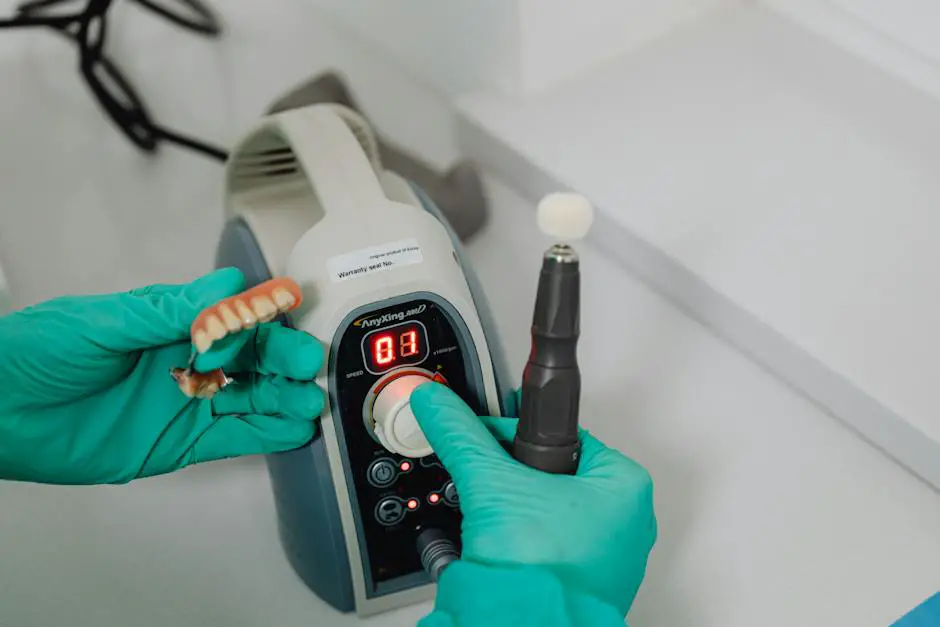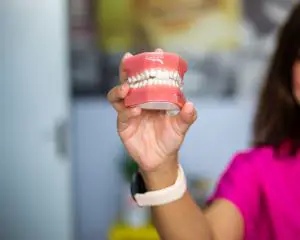Foods to Eat for People with New Dentures
Embracing life with new dentures can be quite a journey, requiring a certain level of adaptation, particularly when it comes to food choices. As an integral part of this change, understanding and mastering the dietary techniques becomes inevitable for a smooth transition. This article is crafted with utmost care to provide a friendly guide, shedding light on the initial diet challenges new denture wearers may face and sharing practical tips to alleviate them. Strolling further, we delve into must-have foods for those in the early period of their denture journey, followed by advice on transitioning back to a regular diet. All this, while maintaining the charm of food experiences collectively gathered from long-term denture wearers. Prepare to embark on an enlightening yet comforting journey that will equip you with the knowledge and understanding required to enjoy your meals, dentures, and all.
Understanding the Initial Diet Challenges for New Denture Wearers
Navigating the Food Front: An Insight into the Initial Challenges for New Denture Wearers
Isn’t it the most rewarding sight to see our loved ones enjoying a good meal together at the dinner table? It’s a scene every parent treasures, but it can be a tough spot when one of the family members has just started wearing dentures. Adapting to this new aspect of oral health can be a little overwhelming, particularly when it comes to food.
There’s no denying the shift from natural teeth to dentures will come with its unique challenges. Denture wearers often need to learn a whole new way of eating and drinking. But, as with anything in life, understanding these challenges is the first step towards overcoming them. So, let’s talk about the common initial food-related hurdles that new denture wearers might face.
- Sensitivity and discomfort: This is not too surprising as the mouth is introduced to a foreign object. The gums and oral tissues may feel sensitive or sore during the initial days of denture use, making eating feel somewhat unpleasant. Whether it’s biting into a crunchy sub or savoring hot coffee, it can take a little time for the mouth to acclimate to this new presence.
- Struggle of chewing certain foods: New denture wearers often find it tough to handle fibrous vegetables, tough meats, or hard and sticky candies at the start. Chewing with dentures isn’t the same as natural teeth. It requires even distribution of food on both sides of the mouth to prevent them from moving or dislodging. This might take a bit of time, practice, and patience to master.
- Sensitivity to hot temperatures: Sometimes the struggle extends to identifying warm or hot temperatures of the food or beverages. This is because dentures can act as an insulator, reducing your mouth’s ability to sense temperature. It’s important to be cautious while drinking or eating anything hot to avoid burns.
- ‘Taste factor’: Some denture wearers might feel a slight change in the taste of foods initially. It doesn’t mean your favorite lasagna recipe changed overnight. It’s just that a portion of the roof of the mouth is now covered by the denture, which interferes with the taste buds temporarily.
- Speed: And finally, it’s all about the speed. One of the biggest changes new denture wearers might have to adapt to is slowing down while eating or drinking. It’s not just about savoring the flavors; it’s to ensure the dentures stay in place and don’t cause discomfort.
Remember, like any change, this too will require some adjustments and patience. Alongside these practices, make sure to follow your dentist’s advice for denture care and maintenance.
As parents, family heads, or caregivers, understanding these challenges makes us better equipped to make the transition smoother for our loved ones. And let’s not forget, it opens the doors to empathize, care, and stand by our dear ones during this ride. After all, overcoming challenges together and enjoying life’s simple pleasures is what makes a family bond stronger, right?
Trust in the journey, take it one bite at a time, and don’t let dentures take away the joy of savoring a family meal together!

Best Types of Foods to Begin With Post-Denture
Adjusting Your Family Feast: Diet Choices After Getting New Dentures
Transitioning to dentures can be a bit challenging, particularly in the first few days or weeks. Your loved one might experience a slight change in their food preferences, and that’s completely normal! Let’s delve into some of the best food choices one can make when adjusting to a new set of dentures, and why they’re beneficial.
Topping the list are smoothies, an excellent choice after getting new dentures. They provide a versatile way of getting nutrients in a easy-to-eat form. Think velvety blends of fruits, green veggies, milk or dairy-free alternatives, and a hint of honey or agave. What a delicious and nutritious way to kick-start the day, without worrying about denture discomfort!
Soft fruits and vegetables can also be delightful, especially when cooked or steamed. Try serving up a plate of steamed broccoli, mashed potatoes, or baked butternut squash. As these foods require little to no chewing, they reduce the risk of denture dislodging and give the jaws a much-needed break.
It’s good news for our soup lovers, too! Broths, stews, and soups filled with finely chopped or pureed veggies are not only gentle on the gums but also pack in plenty of flavor and nutrition. They can be served at moderate temperatures to avoid irritation from hot foods.
Eggs are another great option, offering high-quality protein. Scrambled or poached, they’re soft, easy to chew, and won’t cause trouble to your dentures.
Then there’s fish. Cooked salmon or tuna can be easily mashed and don’t require strenuous chewing. Additionally, they’re rich in Omega-3 fatty acids, which can contribute to overall health.
Grains are not to be overlooked either. Oatmeal, rice cream, and finely grounded whole-grain breads make fantastic denture-friendly dishes, while also providing essential fibers. Try a warm bowl of oats sprinkled with your favorite soft fruits and a drizzle of honey for a satisfying meal.
In the sweets department, sugar-free puddings, jellies, and overripe bananas are popular choices that are light on the gums and easy on the palate.
Finally, remember the importance of good hydration. Water plays a fundamental role in digestion, nutrient absorption, and keeping the mouth moist, which can alleviate any initial discomfort with dentures.
Transitioning to dentures doesn’t have to equate with giving up the joy of food. While adjusting to this new routine may seem daunting to your loved one, it can also open a door to discovering new favorites. Through empathy, patience, and a bit of kitchen experimentation, we can ensure that food continues to be a source of comfort, connection, and joy at the family table.
Transitioning Towards a Regular Diet While Wearing Dentures
After the initial period of adjustment when wearing dentures, incorporating solid foods back into a loved one’s diet can seem a daunting task. Yet, with the right knowledge and a sprinkle of patience, the process can be made less intimidating and more exciting.
A good transition strategy is to introduce solid foods gradually. Starting with thinly sliced fruits and vegetables is a great idea. Apples, cucumbers or bell peppers can be sliced wafer-thin and can be chewed easily. These not only bring back the crunch that many denture wearers might miss, but they also add fiber and variety to their meals.
In between these lighter fare, more substantial foods can be introduced. Ground meats like beef or poultry make an excellent choice because they are easier on the gums compared to solid meats. They can be used in a variety of recipes – think delicious turkey burgers or nourishing beef stew. Remember to let these meats cook well before serving to ensure they’re tender and easy to chew.
It’s also helpful to explore a variety of ways to prepare foods. Steamed vegetables are an excellent choice, particularly broccoli, cauliflower, and carrots. The steam makes them softer, yet retains their nutritional benefits. Introducing these to loved ones might bring wonderful colors and flavors to their plate, as well as boost their daily vitamin intake.
A word of caution though, while integrating solid foods, certain hard-to-chew foods should be avoided. Foods such as popcorn, nuts, and crusty bread can be tough on the gums and can potentially dislodge dentures if not chewed carefully. Likewise, extremely sticky and chewy sweets, like toffee or marshmallows, should also be consumed sparingly.
Patience is paramount when helping loved ones navigate this new eating experience. Encourage them to continue chewing slowly and evenly on both sides of their mouths. This not only alleviates the pressure on the gums but also helps prevent the likelihood of dentures shifting.
Even as they progress, remind them to continue practicing good oral care, as recommended by their dentist. Regular cleaning, coupled with frequent check-ups, can go a long way in ensuring the longevity of dentures and maintaining their oral health.
Lastly, keep the line of communication open. Ask them how their food feels, listens to their concerns, and celebrates their success. This not only makes them feel cared for, but it also creates a sounding board for them, making the transition smoother.
While this journey promises its share of hurdles, remembering that it’s all to favor your loved one’s health will make the process rewarding. Thankfully, this new chapter comes with a generous side of shared smiles, proud moments, shared meals, and hearty laughter. Enjoy the journey!
Tips and Tricks for Long-Term Denture Wearers
Mastering the Meal: Adapting Food Habits for Long-Term Denture Wearers
As we age, feeding ourselves takes on a new form. If you’re the wearer of dentures or the caregiver of someone who is, you’ll find that an adjustment in eating habits can largely enhance their comfort and health. Let’s delve into some tips and tricks for long-term denture wearers and their culinary quests.
Firstly, throughout the transition from not wearing dentures to becoming accustomed to them, remember to be patient. It’s a process. Look to gradually include more solid food types into your diet, beginning with thinly sliced fruits and vegetables. They are easy to bite into and delicate on dentures. A simple way to add variety to the diet is by introducing various textures of your meals. Crunchy thin slices alongside silky smooth purees can be a great starting point.
Another excellent approach is to introduce ground meat. Instead of attempting to bite into a thick steak, consider finely group beef, turkey, or chicken. They provide the protein you need without straining your dentures. In the same spirit, fish like salmon or tuna, which can be easily flaked, is another excellent protein-rich alternative.
Vegetable preparation methods also have a significant role in eating with dentures. Steaming vegetables like broccoli, cauliflower, or carrots until they are soft can make them more manageable, nutritious, and flavorful. In the same vein, baking or lightly sautéing vegetables with a bit of olive oil and garlic is a way to enrich the flavor without complicating the chewing process.
Of course, when it comes to food, there will be a list of items better left untouched. Those hard-to-chew items and sticky sweets increase the chances of dentures dislodging or can even cause damage. Foods to avoid include popcorn, hard nuts, hard candy, and sticky pastries.
One fundamental principle is to adopt the rhythm of slow and even chewing on both sides. This habit balances the pressure on your dentures and enhances your digestion. Remember, it’s not a race, it’s about savoring every morsel.
Along with all these food-related tips, maintaining regular oral care cannot be underestimated. Dentures require as much, if not more, attention as natural teeth. Regular cleaning and checkups aid in prolonging the lifespan of your dentures and keeping your mouth healthy.
Communication is key in this transition. If you’re the caregiver, lend a patient and understanding ear. If you’re the denture wearer, voice your concerns or any discomfort experienced. No two people’s journey is the same, and changes might need to be adapted.
Upon reflection, the journey to adapt to life with dentures can be wholesome and rewarding. Getting the hang of your new lifestyle takes time and effort, of course, but with these tips in your toolkit, it can surely be less daunting. Bon Appétit!
Living with dentures doesn’t mean compromising on your favorite foods or giving up the joy of meals. With a willingness to adapt and the right guidance, a denture wearer can progress from soft foods to a regular, balanced diet in no time. As you bravely take on your denture journey, remember that patience and gradual changes are the keywords. Include the identified foods in your meals, turn the shared tips into daily habits and watch as they help you immensely in managing your food challenges. You aren’t alone on this journey, and there’s a large community of denture wearers who are successfully relishing their meals. So, stay positive, keep experimenting, and soon enough, you’ll find your own comfort food zone within the fascinating universe of denture-friendly foods.
















